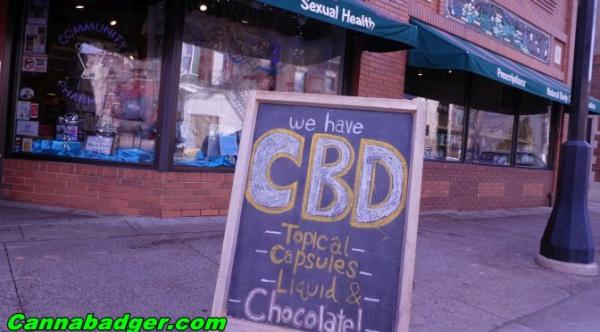Green Bay's Fox11 News has reported that preliminary numbers show the Wisconsin Department of Agriculture, Trade and Consumer Protection (DATCP) received 341 applications for the hemp pilot program, of which 248 were for growing hemp and 94 for processing. But so far, most media has been quiet about a controversy that erupted Monday, April 30, the day before the licensing application deadline, when DATCP sent out a message on their hemp listserve and placed on their website a document from the Wisconsin Dept. of Justice titled "WSIC Analytical Note," dated April 27, that possession and sale of CBD is illegal in Wisconsin.
For those following the progress of 2017 Wisconsin Act 100 from introduction through passage and enactment into law, it has seemed very clear that CBD production and sales would be legal under the hemp pilot program.
With the Wisconsin DOJ's position paper stating the exact opposite, state hemp advocates and entrepreneurs are feeling betrayed. We reached out to DATCP along with some license applicants and small businesses, the Wisconsin Farm Bureau, and several lawmakers for their reaction. We did not hear back from any lawmakers by the time of publication. UPDATE: 05/04/2018 1:38:47 PM Rep. Dave Considine (D-Baraboo) issued this statement Friday 5/4: Rep. Considine Statement on CBD Analytical Note
We also touched base with Colorado-based Bluebird Botanicals, who confirmed they have temporarily stopped shipping to Wisconsin. Bluebird told us, via Facebook, "We've got lawyers and lobbyists monitoring the situation, we hope that this all changes soon."
The concept that 2017 Wisconsin Act 100 allowed the production and sale of CBD in Wisconsin was a key point since it was first proposed in late 2016 by Rep. Jesse Kremer (R-Kewaskum). And once Kremer and Sen. Patrick Testin (R-Stevens Point) introduced the bill, mention of cannabidiol was made in the bill's nonstatutory provisions, and this is contained in Act 100, Section 15, Nonstatutory provisions, (d) That cannabidiol and hemp seed oil have the ability to provide relief for maladies, without psychotropic effect. Clearly the legislative attempt was to legalize CBD production in Wisconsin.
We messaged Brian Kuhn, DATCP's plant industry bureau director asking what the agency had to say to people feeling betrayed by the Analytical note and why this potential confusion was not addressed earlier in the process. Donna Gilson, Communication specialist, Agricultural Resource Management Division of DATCP, replied on Kuhn's behalf, saying they received the Analytical note late on Friday April 27.
Here is her full response:
"We received the WSIC guidance late Friday, April 27. We weren't aware that the document would be coming out, or of the contents. We emailed it to our industrial hemp list, including applicants and licensees, on Monday, April 30. We have been careful all along to caution anyone interested in producing industrial hemp for CBD oil and other uses that there are legal ambiguities and risks surrounding the industrial hemp research pilot program. Our FAQs about the industrial hemp program, available on our website, include a reference to CBD oil, which states, 'It is the licensed processor's responsibility to ensure that any CBD extraction or the production of CBD-containing substances complies with all laws and regulations, including any distribution to be conducted as part of marketing research'". - Donna Gilson, Communication specialist, Agricultural Resource Management Division of DATCP
Rob Richard, Senior Director of Governmental Relations from the Wisconsin Farm Bureau Federation, who has been heavily involved in bringing the hemp issue to passage, says the Farm Bureau is engaged in challenging the findings of the DOJ position paper. Richard said not only are state hemp farmers and processors facing "very real legal and financial impacts" because of the DOJ proclamation but this extends to individuals from around the country seeking to make "significant investments" in Wisconsin.
He also noted that he had heard DATCP received more than 250 applications to grow and process hemp, and it was likely "a significant number" intended to produce CBD. The planning and investment those applicants put into it, he said, is now "in serious jeopardy".
Richard says the Farm Bureau has "conveyed to the Department of Justice the serious nature of this document," and he hopes a solution can quickly be found "to retain the remarkable excitement surrounding hemp and the investment, jobs and tax dollars this industry will create."
License applicant Abbie Testaberg said that while she was aware of the complex legal framework regarding CBD in relation to 2017 Act 100, she said the emergency rules DATCP issued did not offer much in the way of clarification.
Testaberg said that over multiple conversations with DATCP she felt the agency made clear they were trying hard to better understand the situation, and that she agreed with Gilson's statement regarding the Analytical note based on her experiences with DATCP. "I don't see this as purposeful misleading by DATCP, but an untimely response by DOJ. DATCP and other organizations asked DOJ early on for clarification on their interpretation. Based on the release date of the WSIC Analytical Note - DOJ has more responsibility in the poor timing," she added.
Testaberg said she did take issue with DATCP's bolded red statement that 'Holding a DATCP license does not authorize you to produce or sell CBD oil or CBD products.' "Many of us do not think the DOJ interpretation as argued in the Analytical Note is correct, she said. "It appears they are standing with the DOJ interpretation of the law. This has broader implications for zoning and land use approval. Unfortunately, we are all in a position to have to be arrested to test that in court."
Rachel Cartwright, owner of CBD Therapeutics of Wisconsin, says her company plans to continue regular business operations, and they are in consultation with their attorney on their next steps. Cartwright told Cannabadger that "We refuse to discontinue service to our clients who now require the use of CBD Therapy to manage their ailments, conditions, and pains. We will not be bullied by a memo."
Cartwright said CBD Therapeutics is offering to pay the $200 municipal fine customers could receive for possessing their products. "We will not let our retailers be bullied either. We are offering the same $200 payment of the municipal citation, and payment for loss of any product due to confiscation by authorities. This is our way of making sure folks can still get the CBD they need without worrying about the $200 fine," she said.
Cartwright noted that "A little girl lost her life awaiting CBD in Wisconsin. I started my business to make sure that would never happen again. I will continue my business to make sure no child loses their life to a battle with Intractable Seizures again. "It is also our full intention to seek the help of our state legislature to clarify the laws and rules around hemp sourced CBD. We ask that every one do the same. We are ready to fight for the residents of WI to be able to access CBD Therapy," she added.
Cannabadger received an email May 1 from an individual who said they waited until April 28 to apply in case DATCP made last minute changes. He claimed not only did the guidance about hemp not appear on DATCP's website until April 30, he also had a conversation about his plans to produce CBD that day with someone from DATCP's hemp licensing program and that "she never said a word about not being able to possess/process CBD." He felt that DATCP took people's money and changed the rules.
He cited DATCP's "WI Hemp FAQ's" packet that was supplied to applicants, which contained a section titled, "What about cannabinoids, like CBD?" The section discusses CBD and notes, "It is the licensed processor's responsibility to ensure that any CBD extraction or the production of CBD-containing substances complies with all laws and regulations, including any distribution to be conducted as part of marketing research."
He found that was misleading and asked, "Isn't this where it should state that CBD is still illegal? Why would this be in the permit information packet if it were illegal?" He said he was left feeling "completely taken advantage of, duped and lied to."
U.S. Rep, Ron Kind visits Priceland Hemp in Black River Falls on April 20, 2018. (Source: Priceland Facebook page,)
Joel Peterson, owner of PriceLand Hemp Growers, which says they are "Wisconsin's first authorized hemp dealer and storefront" opened in Black River Falls on April 20. Peterson said they have heard from Wisconsin Assistant Attorney General Amber Hahn who visited the store, and that local police came in and tested hemp products for THC content as well. PriceLand's grand opening received a slew of positive media coverage, and U.S. Rep. Ron Kind visited the store on April 20. Peterson forwarded a couple messages he had sent to WI DOJ and AAG Hahn recently taking issue with the DOJ position on CBD and the position paper.
Peterson says provisions outlined in a Legislative Council Amendment memo published November 9, 2017, say they are exempt from criminal prosecution under the state Uniform Controlled Substances Act and exempt from municipal prosecution, unless such prosecution is referred by DATCP. A message he had sent to AAG Hahn refers to this and indicates if there are further disputes over the law they would be retaining the Denver-based Hoban Law Group, a firm that specializes in hemp-related litigation. The second message took issue with the WSIC Analytical memo disputing the DOJ's authority to intercede in the hemp pilot program and stating the federal Hemp Farming Act of 2018 will remove hemp and hemp-derived products from the Controlled Substances Act.
Cannabadger also reached out to Heather Blessington, Founder of New Berlin-based Blessington Botanicals LLC, which she opened in 2016, with a focus on Community Education about both Medicinal Hemp and Cannabis. Blessington said a big focus of her business is educating parents and patients on selecting the purest and most effective plant oils in treating seriously ill children, which she does in conjunction with The Realm of Caring Foundation in Colorado Springs CO with research partners Johns Hopkins and Stanford.
She said her primary concern after reading the Analytical note was for clients, particularly parents with seriously ill children who "depend upon hemp based oil to stay alive and functional and have no other option." From a business perspective, Blessington does see some silver lining in the DOJ proclamation in that she feels it adds urgency to the fight to legalize CBD for medicinal purposes at the federal level.
Calling the situation "a horribly sad and dangerous state of affairs for the State of Wisconsin", Blessington said the bottom line is, "We were not put here to suffer. I will not stop until every single citizen in the State of WI is free of unnecessary pain, free of guilt and shame surrounding a plant that is nothing short of sacred."
With so much at stake here, let's hope Wisconsin officials can get this worked out before lasting harm is done. This is a developing story and Cannabadger will be following this situation.


